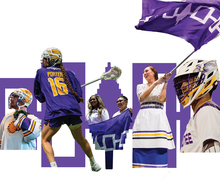Opinion: Media literacy is required to protest current executive action
Flynn Ledoux | Illustration Editor
Echo chambers in the media pose a threat to society. Our columnist cites President Trump’s recent executive actions as proof of growing misinformation and complete ignorance to research.
Get the latest Syracuse news delivered right to your inbox.
Subscribe to our newsletter here.
Most nights of the week, you’ll find my roommate and me staying up late in our living room; she’s wrapped in a blanket on the couch while I’m curled into a ball in our orange disk chair.
We’ve been at a loss recently. It’s perplexing that President Donald Trump successfully won the popular vote and many seem to lack a basic understanding of civics. We keep noticing how research and facts we share consistently get swept under the rug, making room for discriminatory rhetoric and hate speech.
A solid understanding of media literacy is necessary in order to make educated decisions on current events. Just as you wouldn’t buy an apple at the grocery store without inspecting it for bruises, you can’t choose the right affiliations without first learning their elements.
The Marketplace of Ideas is a theory of free speech built on the belief that if people can access a wide variety of information, the most truthful and accurate ideas will emerge as the most widely accepted. It refutes censorship and instead relies on the general public to determine what information to accept as fact.
But my roommate and I have realized this isn’t the case right now. There’s a dangerous lack of understanding on what true media literacy is, and further, how being literate online applies to our constantly evolving media landscape.
A lack of exposure to other points of view, or properly-sourced reporting for that matter, ultimately contributes to increased political polarization.Gray Reed, Columnist
While 72% of all Americans say media literacy skills are needed to properly identify inaccurate information, a survey by the News Literacy Project found less than 20% of teenagers could accurately identify different types of information — opinion, news, education, advertisement — without any errors.
For many students in the United States, this lack of access to proper media literacy education stems from not having access to it in the first place. Many marginalized groups don’t have certain educational opportunities due to intrinsically discriminatory systems. But for those of us privileged enough to go to a university with access to a wealth of resources, there’s no excuse to neglect teaching yourself these necessary skills.
It’s easy to say media literacy is important without actually understanding and applying the skills that accompany it. Part of this issue comes from online echo chambers, where algorithms feed media consumers enough opinions in alignment with their preexisting views to the point where users believe them as fact.
Echo chambers are also reinforced by media outlets that market themselves as valid news sources, when in reality they exert overwhelming political bias. Textbook examples are CNN and Fox News, leaning almost exclusively left and right-wing, respectively. This hegemony trickles into less traditional forms of media, like the Joe Rogan Experience podcast available on your streaming apps.
A lack of exposure to other points of view, or properly-sourced reporting for that matter, ultimately contributes to increased political polarization. We’ve reached a point where people completely disregard other points of view — and thoroughly-researched factual content — in order to remain sheltered in their own thought-bubble.
The dismal reality depicting opinion or science as propaganda is not only incorrect but dangerous, especially when our president is encouraging it.
The laundry list of executive orders released from the White House since Trump’s second inauguration has repeatedly been built upon misinformation and complete ignorance to research. For example, a recent order released on Jan. 20 outlines the new government policy of only recognizing two sexes, male and female, and how it will no longer recognize people changing their birth-assigned sex.
But this order completely overshadows the scientifically proven existence of people born as intersex and the transgender community. Recent research in areas including sociology, biology and psychology continuously reflect and support the experiences and presence of these communities.
Trump’s actions reinforce the idea that media literacy is unnecessary, and encourage the general public to not question the information around them or think for themselves. It’s vital to act and consume mindfully when so much is uncertain.
Media literacy education in schools is necessary if we want to mold new generations of sensible adults who make educated, not easy, decisions regarding the future of our democracy — choices based on the betterment of all Americans, not lies designed to benefit a select few.
For those of us already at the university level or beyond, it’s not too late to gain these skills. Taking the time to understand where your information is coming from and how it’s presented is crucial to properly understanding our collective options over the next four years and beyond, and to foster a well-informed society.
Scrutinize your news sources for implicit biases, research who funds certain outlets and examine which perspectives they choose to omit.
Without properly analyzing the media we consume, we risk the likelihood of perpetuating misinformation that can lead to poor decisions in critical upcoming elections. Many of us students have just voted for the first time, and becoming more politically aware is essential to making sure each of our future votes is a direct reflection of our beliefs and needs.
Now isn’t the time to sit back and see what happens. It’s crucial we take the time to properly educate ourselves on the realities unfolding around us before it’s too late to reverse any further harm.
Gray Reed is a senior majoring in magazine, news and digital journalism. Their column appears bi-weekly. They can be reached at greed04@syr.edu.
Published on February 5, 2025 at 10:33 pm






